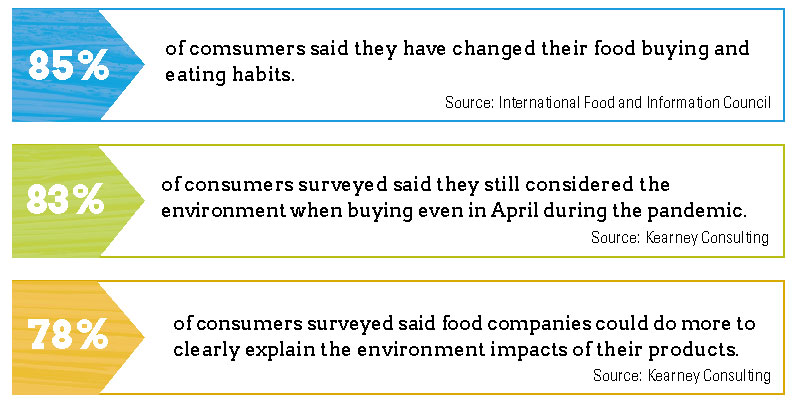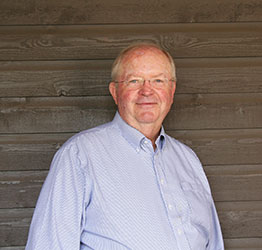Consumer demand calls for food and beverage retailers to ensure brands they carry are sustainably sourced.
By Rick Shanks, Chief Sustainability Advisor of Sustainable Environmental Consultants
Many of today’s food and beverage retailers offer sustainable products for their customers. For many, it’s an essential business practice. Today’s consumers demand to know that the journey of their food, from “farm to fork,” has been traveled in a sustainable way, with all partners involved taking their share of environmental responsibility. This has been particularly true over the last year, as consumer demand for sustainably sourced food and beverage products has accelerated due to the pandemic and an increased focus on personal wellness.
In the past, it was sufficient for products to be labeled as “sustainable” or “ecologically friendly,” but a study from global independent consulting firm, Kearney, found that 78 percent of respondents show consumers have shown an increased interest in knowing more about the environmental measures producers have taken to minimize their impact.
These demands impact the entire supply chain, prompting food and beverage retailers to ensure the products they carry have been sustainably sourced, from the raw ingredients to transportation and packaging.
There’s good reason to cater to these demands. The millennial generation, which leans towards products that embrace sustainability as a core practice, will represent 75 percent of the U.S. workforce by 2025 – an amount of purchasing power that is impossible to ignore. The market for organic foods is also an indicator of consumer awareness around true product sustainability. In 2019 organic food product sales reached over $55 billion, and a survey from Impossible Foods found that 62 percent of Generation Z members were willing to spend more money on sustainable food options.
With increased interest in sustainable food and beverages rising, awareness and interest in thoroughly sustainable practices will rise too. Even now, consumers are starting to ask themselves what “sustainability” really means, and they’re closely comparing brands’ claims against the visible supply chain.
So how can retailers ensure the brands they carry align with the same honesty, transparency, and sustainability standards they strive for themselves? They need an effective way to communicate their efforts.
Consider a food and beverage retailer that maintains a “sustainability pledge” by which all of the brands it sells must adhere to. Perhaps that includes a brand of pasta that itself claims to maintain sustainable practices. How can that pasta brand be sure that all of the components of its pasta are up to the same standards? The retailer needs to be sure that it’s not just the pasta brand that claims sustainability, but also the poultry farm from which it gets its eggs, and the feed provider that provides the feed for chickens, and so on. When you consider additional factors such as water usage, recycling, soil health, and overall carbon reduction in terms of improved transportation or processing operations, there are a lot of sources that need to be proven.
How can the food and beverage retailer selling this pasta brand to their customers be sure that the pasta they’re selling is indeed sustainably produced without verifiable data from all of the suppliers involved in the chain? There may be some anecdotal evidence that the poultry farm supplying the pasta company is using less water or improving its biodiversity, but there are no metrics to tell the full story.
Food and beverage suppliers need these metrics to ensure they are getting recognized for the incredible amount of work they put into ensuring sustainable practices, and to be able to stand up to the scrutiny of consumer demands. With metrics, companies can answer important questions like:
Where do food and beverage suppliers and their producers start when it comes to metrics? One of the best ways to gather data and answer these questions is through an independent, third-party verification platform like EcoPractices® from Sustainable Environmental Consultants.
Armed with these verified metrics, producers in the supply chain can participate in the production of food and beverages with stringent sustainability practices. The value of validation carries throughout the supply chain, all the way to the retailer. With hard evidence to reinforce sustainability claims, food and beverage retailers have a powerful tool to support the reputation of the products they sell and their own brand as a sustainable grocer. Furthermore, this data can be shared on signage, social media, and marketing campaigns to enhance its impact.

Surveys show that consumers are thinking differently about their food habits driving them to cook eat, shop, and think about food differently.
Of course, this verified data has value to the consumer too. After all, consumer demand for verification is driven by the desire to participate in a sustainable production as the end-user. By buying verified products, consumers are supporting farms and other providers that value investment in sustainable practices, giving them a competitive advantage and creating a reciprocal effect in making products even more sustainable.

Rick Shanks
Rick Shanks is the Chief Sustainability Officer of Sustainable Environmental Consultants and is responsible for identifying areas of opportunity, providing insight into food system and agribusiness operations, and developing sustainability risk reduction solutions. He brings to the business more than 30 years of experience in the food and agribusiness industry.
CONTACT INFORMATION
rshanks@sustainableenviro.com | https://sustainableenviro.com
Scott Ellyson, CEO of East West Manufacturing, brings decades of global manufacturing and supply chain leadership to the conversation. In this episode, he shares practical insights on scaling operations, navigating complexity, and building resilient manufacturing networks in an increasingly connected world.